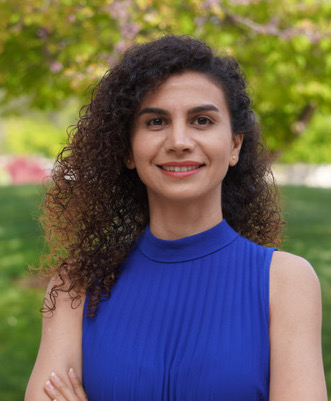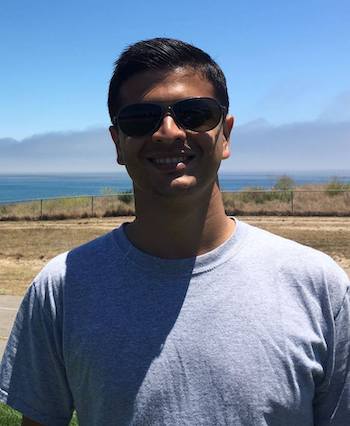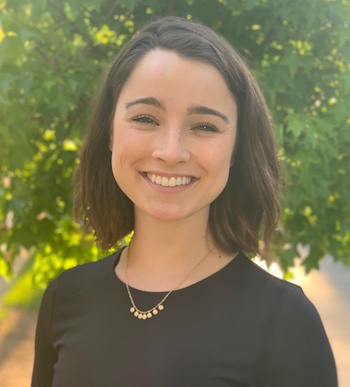The final round of George Mason University’s fifth annual Three-Minute Thesis (3MT) competition was held virtually on April 9. From this year’s 13 finalists, the judges chose three first-place winners—two doctoral students from the Department of Bioengineering in the Volgenau School of Engineering and a PhD student from the Department of Psychology in the College of Humanities and Social Sciences—and three second-place winners.

Mason bioengineering PhD student Sara Hadad spoke on “Predicting Brain Aneurysm Growth,” explaining what an aneurysm is and describing the artificial intelligence (AI) computer model she is working on that could help predict which aneurysms are dangerous and need immediate treatment.
Hadad said she wanted to participate in the competition because, as a PhD student, she is often asked about her research.
“It can be quite challenging to explain my research,” said Hadad, who has bachelor’s and master’s degrees in mechanical engineering from the Isfahan University of Technology in her native Iran. “So I thought this competition would give me an opportunity to practice explaining my research in a short time to nonspecialists.”
Hadad came to Mason to work with Juan R. Cebral, who leads Mason’s Computational Hemodynamics Lab and is a leading expert in this field. She was also interested in the campus culture.
“As an international student, being in an international-friendly environment is important to me,” Hadad said. “And Mason is very good at making students from other countries feel comfortable.”
While bioengineering doctoral student Shriniwas Patwardhan wasn’t worried about the public speaking aspect of the competition—he has a theater background, he did feel challenged to explain the work he does without using jargon when presenting “The Senses and My Hand: An Investigation for Multi-Sensory Feedback for Prosthetic Control.”

“I think that being able to communicate your work to a broad audience is almost as important as being able to do the work itself,” Patwardhan said of his reasons for entering the competition. “If I have truly understood the problem at hand, I should be able to explain it to an audience with any expertise level within any given timeframe.”
Patwardhan, who is working with Mason bioengineering professor Siddhartha Sikdar in Mason’s Biomedical Imaging Lab, came to Mason to specifically to work with prosthetics.
“Mason offered me a chance to follow my passion of working closely with prosthetics and more broadly with all types of interesting questions in rehabilitation science,” said Patwardhan, who has BE in electrical engineering from the University of Pune and an MS in electrical and computer engineering from the University of California, Santa Barbara. “I decided to join my current lab because it offered me the freedom and opportunities to follow my research interests wherever they may lead me.”
Clinical psychology PhD student Paige Trojanowski, who spoke on “Preventing Eating Disorders in Teen Girls with Type 1 Diabetes,” explained how disordered eating can lead to medical complications for teens with Type 1 diabetes and described a prevention program she developed and tested.

Trojanowski is in the sixth year of Mason’s Clinical Psychology PhD program and is preparing to start her clinical internship at the University of Florida in the Pediatric Psychology Track.
“I will work mainly with children and adolescents with medical conditions—such as Type 1 diabetes, cancer, and cystic fibrosis—and their families,” said Trojanowski, who has a BS in neuroscience from Ohio State and MA in psychology from Mason. “I defended my dissertation right before leaving [Virginia] but will be spending significant time writing it up for publication over the next year.”
Trojanowski said she came to Mason to work with Department of Psychology professors Sarah Fischer and Robyn Mehlenbeck.
“Dr. Fischer was conducting research in eating disorders, and I was especially interested in her neuroimaging work,” Trojanowski said. “However, I realized once I started that I did not want to do neuroimaging work, and I fell in love with pediatric psychology and working with kids with medical conditions.”
The second-place winners were writing and rhetoric doctoral student Sarah Johnson, who spoke on “Mortuus et Vivus, Absent et Present: Identifying and Dismantling the Standard English Paradox”; environmental science and public policy doctoral student Chase LaDue, who spoke on “Using Integrative Science to Conserve Asian Elephants”; and education doctoral student Sara Montiel, who spoke on “Exploring the Assets of First-Generation College Students Who Are Children of Immigrants.”
First-place winners were awarded $1,000; second-place winners received $750.
Laurence Bray, associate provost for graduate education at Mason, said the competition has grown each year.
“This year was different as doctoral students had to face additional challenges due to the pandemic, which in most cases resulted in limited research capabilities,” said Bray, who coordinates the event. “It really showed our students’ perseverance and resilience.”
Judging the competition was a combination of scientific community members and Mason faculty and staff: Dulce Carrillo, coordinator of community engagement of Arlington Public Schools; Kimberly Holmes, associate dean for student affairs in Mason’s College of Health and Human Services; Robert Duncan of the U.S. Food and Drug Administration’s Center for Biologics Evaluation and Research; and Hironao Okahana, associate vice president of research and policy analysis of the Council of Graduate Schools.
Originating in 2008 at Australia’s University of Queensland, 3MT competitions now take place annually at more than 900 universities across 85 countries.
“Having such a strong group of presenters and listening to their work made [this competition] even more special,” Bray said. “I am very proud of all the students who took the time and found the motivation to compete this year.”
